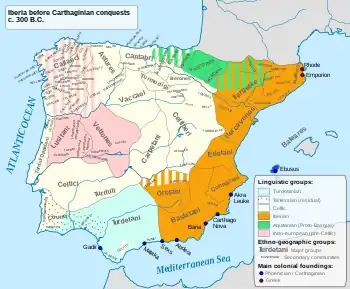Edetani
Latin
Etymology
From Edeta, their chief city.
Pronunciation
- (Classical) IPA(key): /e.deːˈtaː.niː/, [ɛd̪eːˈt̪äːniː]
- (Ecclesiastical) IPA(key): /e.deˈta.ni/, [ed̪eˈt̪äːni]

The Iberian Peninsula in the 3rd century BC.
Proper noun
Edētānī m pl (genitive Edētānōrum); second declension
Declension
Second-declension noun, plural only.
| Case | Plural |
|---|---|
| Nominative | Edētānī |
| Genitive | Edētānōrum |
| Dative | Edētānīs |
| Accusative | Edētānōs |
| Ablative | Edētānīs |
| Vocative | Edētānī |
References
- Edetani in Gaffiot, Félix (1934) Dictionnaire illustré latin-français, Hachette
- “Edetani”, in Harry Thurston Peck, editor (1898) Harper's Dictionary of Classical Antiquities, New York: Harper & Brothers
- “Edetani”, in William Smith, editor (1854, 1857) A Dictionary of Greek and Roman Geography, volume 1 & 2, London: Walton and Maberly
This article is issued from Wiktionary. The text is licensed under Creative Commons - Attribution - Sharealike. Additional terms may apply for the media files.